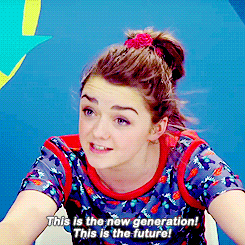CountAntonius
Member
Via Time
More at the link. Some of these are terrible.
Merriam-Webster has revealed 150 new words that will be added to its collegiate dictionary this year, ranging from 'hashtag' and 'catfish' to 'dubstep' and 'crowdfunding,' most of which speak to some intersection of pop culture, technology and the Internet
Today Merriam-Webster, America’s best known keeper of words, announced new entries for their collegiate dictionary in 2014. Among them are telling specimens like selfie, hashtag and steampunk, reflecting lasting cultural obsessions that have become widespread enough to earn a place in the big red book.
Here is a selection of the new words, with their definitions and the earliest year Merriam-Webster editors could find them being used:
Auto-Tune (v., 2003): to adjust or alter (a recording of a voice) with Auto-Tune software or other audio-editing software esp. to correct sung notes that are out of tune
baby bump (n., 2003): the enlarged abdomen of a pregnant woman
brilliant (adj., new sense): British: very good, excellent
catfish (n., new sense): a person who sets up a false personal profile on a social networking site for fraudulent or deceptive purposes
crowdfunding (n., 2006): the practice of soliciting financial contributions from a large number of people esp. from the online community
dubstep (n., 2002): a type of electronic dance music having prominent bass lines and syncopated drum patterns
e-waste (n., 2004): waste consisting of discarded electronic products (as computers, televisions, and cell phones)
fangirl (n., 1934): a girl or woman who is an extremely or overly enthusiastic fan of someone or something
freegan (n., 2006): an activist who scavenges for free food (as in waste receptacles at stores and restaurants) as a means of reducing consumption of resources
gamification (n., 2010): the process of adding game or gamelike elements to something (as a task) so as to encourage participation
hashtag (n., 2008): a word or phrase preceded by the symbol # that clarifies or categorizes the accompanying text (such as a tweet)
hot spot (n., new sense): a place where a wireless Internet connection is available
paywall (n., 2004): a system that prevents Internet users from accessing certain Web content without a paid subscription
selfie (n., 2002): an image of oneself taken by oneself using a digital camera esp. for posting on social networks.
social networking (n., 1998): the creation and maintenance of personal and business relationships esp. online
(n., 1994): a reviewer’s warning that a plot spoiler is about to be revealedspoiler alert
steampunk (n., 1987): science fiction dealing with 19th-century societies dominated by historical or imagined steam-powered technology
turducken (n., 1982): a boneless chicken stuffed into a boneless duck stuffed into a boneless turkey
tweep (n., 2008): a person who uses the Twitter online message service to send and receive tweets
unfriend (v., 2003): to remove (someone) from a list of designated friends on a person’s social networking Web site
More at the link. Some of these are terrible.






